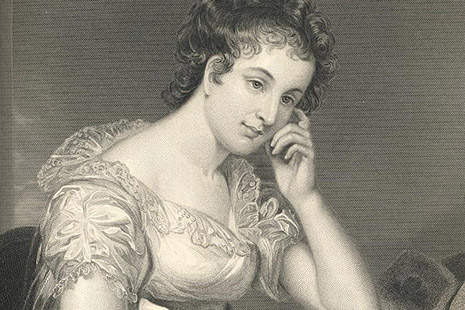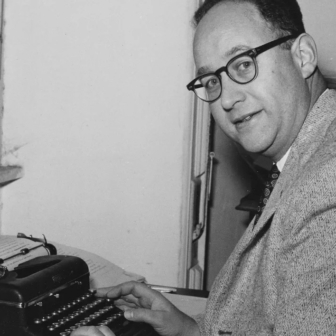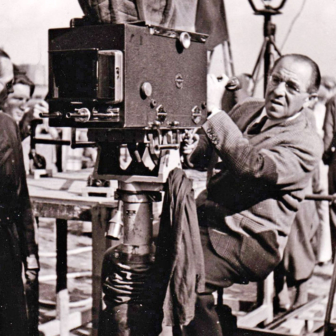Helen
Maria Edgeworth | Sort Of | $22.99
HOW MANY people nowadays are reading – have read – the prolific Maria Edgeworth, who published a series of novels between 1795 and 1834? How many, like myself, would have to confess to thinking of her only in terms of Jane Austen’s disparaging reference to her works in Northanger Abbey? What place, if any, can she command in the great trajectory of the English novel of the past 250 years or so?
Having just read her for the first time, I can only say how ignorantly wrong has been my failure to take notice. Her last novel, Helen, published in 1834 and reissued last month, is an eye-opener. She was sixty-six when it appeared, but there is nothing about it to suggest senescence. In style it is invariably acute, in structure it is sturdy, and in attitudes strong-minded and surprisingly modern. Remiss as I have been, I can’t speak for the rest of her oeuvre, but if Helen were all she had written then she would be entitled to our serious attention.
At the outset one immediately thinks of Mansfield Park. In each, the female protagonist is sent off to live with others. But whereas Fanny Price’s careworn mother is grateful for her wealthy sister’s offer to absorb Fanny into the affluence of Mansfield Park, Helen Stanley has found herself alone in the world after her beloved uncle, Dean Stanley, dies, leaving behind a legacy of integrity – and a pile of debts, the honouring of which makes Helen more or less dependent on others. Her first protectors are the kindly Reverend and Mrs Collingwood, but soon she accepts an invitation to live with her old and dear friend Cecilia, now Lady Clarendon, and her new husband General Clarendon, at (of course) Clarendon Park. When good, simple, trustful Helen arrives there we are at once reminded of Fanny’s situation, but Helen has at least the advantage of Cecilia’s warm regard and cheerful mien, the austere courtesy of the General and, above all, the astute, witty, observant and self-knowing friendship of Lady Davenant, Cecilia’s mother.
The first two-thirds of the novel is set largely in this country seat, to which are invited hordes of visitors for unimaginably long and taxing visits. Had the Clarendons never heard about what happens to fish and house guests after three days? But one of these guests is Granville Beauclerc, ward to General Clarendon and (sort of) protégé to Lady Davenant, and before long he and Helen recognise each other as soulmates. There is an early-morning walk by a river that recalls the romantic skirmishing of Austen’s Elizabeth and Darcy and, like that pair, they will be separated by misunderstanding and duplicitous report. This latter, growing out of some ill-advised letters Cecilia wrote before her marriage, leads the Clarendons and Helen to London, where the General plans to quash their publication in a memoir. It could be argued that too much is allowed to hinge on the fact of Cecilia and Helen’s having near-identical handwriting, but I’d counter such a criticism with the idea that this is an encapsulation of the way the gentle and transparent Helen becomes a victim of her good-hearted but unreliable friend.
London, then, proves to be a major threat to Helen’s happiness. Exposed as she is to the malice of social predators, to the knowing winks of the vulgar and the censoriousness of moral arbiters, she is in danger of losing the man she loves. Edgeworth clearly wants to make a distinction between the kinds of life led in London and the country by the social stratum of her concern. The metropolis may offer greater cultural variety but it is also rife with opportunism as well as opportunity, with the courting of “celebrity” that strikes some resonant modern notes, and with an urge to incessant gregariousness that is at odds with anything to do with a sane and decent inner life. The country, on the other hand, provides tranquillity and a sense of closeness to nature that are only disturbed by the procession of visitors variously tiresome or vindictive.
Edgeworth shares Austen’s preoccupation with the connection between manners and morality, and she is at least as tough-minded as her great contemporary in this regard. If the book ends on notes of resolution, as of course it does and must, it has not been at the expense of any shuffling of the cards: truth is the supreme virtue and reconciliation in fractured relationships can only be achieved, as Lady Cecilia will find, if all the cards are on the table.
Cecilia is a quite brilliantly drawn study in the possible dangers of an undiscriminating good nature that is not reinforced by even higher commitment to truth. I’m aware of making this theme sound too didactic and moralistic and this is not the case. The dangers I refer to are articulated through the course of events and relationships and their outcomes. If the author is as rigorous as Austen, it could also be suggested that her interests are more wide-ranging. Both are concerned with the interaction of the inner and the social lives of their characters, but Edgeworth’s broader social spectrum tends to anticipate the even greater range of Mrs Gaskell, whose first novel, Mary Barton, was published the year before Edgeworth’s death.
In fact, the sense of Edgeworth as being flanked by Austen and Gaskell gives a whole new interest (new to me, anyway) to her work. She has clearly taken Austen into imaginative account: apart from the echoes noted, there are touches of Persuasion’s Anne Elliott in Helen as the disappointed lover stoically playing musical accompaniments for happier persons, of Sense and Sensibility’s comically vulgar Mrs Jennings in good-hearted vulgarian Lady Bearcroft and the bitchy Miss Steeles in a couple of nasty-minded cousins of Clarendon’s, and of Mansfield Park’s vivacious but morally unreliable Mary Crawford in Cecilia. And so on. But Helen is closer in time to Gaskell than Austen and this shows in Edgeworth’s approach to the kinds of society in which her narrative is set. The age has moved on since Austen’s women suffered from misunderstanding and false report. Edgeworth lived just long enough to get a whiff of what we would in hindsight call the Victorian age, whose more complex social interactions Gaskell would so sympathetically map. [I like the idea of contours, but the grammar is demonic]
I’ve mentioned Helen in the same breath as Austen’s Fanny Price. For many, however much they admire Austen, Fanny always seems a bit of a pill. We feel for her disadvantaged position but wish she’d show a little more robustness in the face of her moral inferiors. Miraculously, Edgeworth’s Helen manages to be good without being goody-goody. She keeps our sympathies as she finds herself drawn into Cecilia’s web of deceits, ready to help Cecilia with her problems while being distressed at how far she is compromising her own integrity in doing so. She suffers but doesn’t wilt under the strain of it all, and indeed her variety of goodness assumes the status of real moral aggression as she struggles to keep her head above the murky waters of friendly loyalty into which her affection for Cecilia has drawn her.
She’s surrounded by well-executed female characterisations. Apart from the sketches of the waspish cousin Lady Katrine Hawksby and others mentioned above, there are two really potent figures who recognise the goodness in Helen but, in their different ways, try to stiffen her purpose. First is General Clarendon’s firm-minded, pull-your-socks-up sister, Esther, who nurses Helen back to health and is alert to the perilous possibilities of Cecilia’s hapless good nature. Edgeworth’s skill is in making us aware of the deficiencies in each as an influence on Helen, but also leading us to respect Miss Clarendon’s more realistic view of the world. Second, and more important in her influence on Helen and her contribution to the book’s thematic toughness, is Cecilia’s mother, Lady Davenant. And only as a mother has Lady Davenant, acknowledged as the real power behind her political husband, been negligent, and this negligence seems to spur her on to be seriously watchful over Helen. She reminds me of Persuasion’s Lady Russell in the matter of her influence on the heroine, but she takes leave of the comparison because of her superior insight, her freedom from prejudice and her unillusioned view of gender issues.
In this matter of women’s roles, Lady Davenant – and Edgeworth – are ahead of their times, and certainly some distance from Austen’s. Take, for instance, Lady Davenant’s warning to Helen: “Every girl in these days is early impressed with the idea that she must be married, that she cannot be happy unmarried. Here is an example of what I meant the other day by strength of mind; it requires some strength of mind to be superior to such a foolish, vain, and vulgar belief.”
Charlotte Lucas, married to the absurd Reverend Collins in Pride and Prejudice, ought to have been given advice like this. Lady Davenant has a level of self-awareness, too, that makes her both impressive and intensely credible as a commentator on such matters. She tells Helen “that I have not reason to be quite satisfied with myself as a mother; I did not attend sufficiently to Cecilia’s early education: engrossed too much with politics, I left her too much to governesses, at one period to a very bad one.” When she and Cecilia are at the end reconciled it is in full acceptance of each other’s failings and of the centrality of truth in valuable living.
There are some sharp cameo appearances from men – Churchill, the “male coquette” whose advances Helen rejects, the raffish Beltravers, and the too-austere General Clarendon – but the book’s real drama and power is invested in its study of female lives and the constrictions on them. Presumably feminists in works I am not – but should be – familiar with have seized on the forward-looking dissatisfactions of the book. There are a couple of unduly melodramatic incidents in Helen that the narrative could do without, but overall the book is a revelation to me and I am grateful for having been put in the way of its wit, its daring and its seriousness (not to be confused with solemnity) of intention. If Edgeworth has been overshadowed by her famous antecedent and successor, this reprint of her last work should go some distance to restoring her place. •




